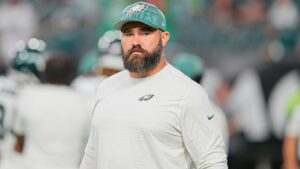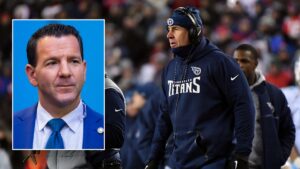
In North Carolina, Republicans managed to flip three congressional seats from Democrat to Republican. This success was partly due to redrawn district maps.
Republicans were optimistic about their chances to win big in North Carolina.
“We will flip from the Democrats to the Republicans … this congressional seat. That’s a huge plus for the Republican Party,” congressional candidate Brad Knott, R-N.C., said at a rally with vice presidential nominee Sen. JD Vance of Ohio just days before the election.
Knott was correct in his prediction, but Republicans did not flip only his seat from blue to red, they flipped a total of three.
THE 2024 ELECTION CYCLE IS DRAWING TO A CLOSE – HERE’S WHAT WE KNOW
“Thanks to your support, I’m going to be the next congressman from the 6th District of North Carolina,” candidate Addison McDowell, R-N.C., said at a Nov. 2 Trump campaign event in Greensboro.
The Republican success had a lot to do with redrawn congressional maps that were backed by a state lawmaker turned congressman-elect.
“I’m Tim Moore, currently the speaker of the House, and in just a few days [I] will be the member for the United States Congress for right here in Gaston County,” said North Carolina speaker of the House and congressional candidate Tim Moore, R-N.C., at a Nov. 2 Trump campaign rally in Gastonia, N.C.
The changes began when North Carolina was given an additional seat on its congressional map due to population growth after the 2020 census. Rep.-elect Moore will now represent that seat
“We’ve got a Republican supermajority in the state House, in the state Senate. We know how to get things done in this state,” Moore said in July.
THE HITCHHIKER’S GUIDE TO THE MEANING OF A REPUBLICAN SENATE – AND WHAT’S AHEAD FOR THE HOUSE
North Carolina’s congressional map was redrawn at least three times before the 2022 midterm elections. Three Democrats won districts 6, 13 and 14. North Carolina’s congressional delegation was split: seven Republicans and seven Democrats. But state Republicans were not satisfied and redrew the map once again before 2024. Moore said at the time that “7-7 does not reflect the will of the voters in North Carolina.”
“At the end of the day, it shouldn’t be up to judges or bureaucrats. It should be up to the people through their elected representatives in the legislature,” Moore said after Supreme Court arguments on the maps in 2022.
After the map that was expected to benefit Republicans was finalized, the three Democrat incumbents decided against running for re-election. District 6’s Kathy Manning, D-N.C., announced she wouldn’t seek re-election in December 2023.
District 13’s Wiley Nickel, D-N.C., decided against running at around the same time and is instead considering a Senate run in 2026 against incumbent Republican Thom Tillis.
District 14 Rep. Jeff Jackson, D-N.C., also criticized the maps and instead ran a successful bid for North Carolina attorney general.
“We need to make sure that folks know how important every single race on the ballot is,” Jackson said while campaigning with Vice President Harris days before the election.
Moore instead won Jackson’s seat. He was first elected to the State House in 2002 and has served as speaker of the House since 2015. He has also been a longtime ally of President-elect Trump and campaigned with him during his 2016 presidential bid.
“I have no doubt he’s going to be our next president of the United States,” Moore said at a 2016 Trump rally in High Point, North Carolina.
The 30-year-old McDowell won North Carolina’s 6th District. He served as a congressional aide for Sen. Ted Budd during his time in the House. McDowell decided to run for the seat after his brother died from a fentanyl overdose.
“I don’t want any of your families to suffer like my family did. We have to stop the flow of fentanyl coming into our country through Mexico. And that’s why we have to secure our southern border,” McDowell said during a Trump campaign rally in October.
TOP REPUBLICAN PRIVATELY BACKING THUNE TO SUCCEED MCCONNELL IN GOP LEADER RACE
Former federal prosecutor Knott flipped North Carolina’s 13th District. He promised to address crime and illegal immigration during his campaign.
“I had the high honor of working under President Trump when we actually prosecuted criminals,” Knott said at a Nov. 3 rally in Selma, North Carolina.
Redistricting also appeared to benefit Democrats this election cycle. In New York, they flipped two competitive seats, even one that was thought to benefit the Republican incumbent.
“What we are seeing with our democracy is terrifying,” congressional candidate Josh Riley, D-N.Y., said during his 2022 campaign.
He first ran for the District 19 congressional seat during the midterm elections. He lost to republican Marcus Molinaro by less than 5,000 votes. That year, Molinaro flipped the seat from blue to red. Two years later, the new congressional maps in New York were thought to help Molinaro’s chances for re-election, but Riley managed to flip the seat back in the Democrats’ favor.
“Tomorrow let’s get to work, tonight let’s celebrate what we accomplished together,” Riley said during his election night remarks.
Just north in New York’s 22nd District, changes to the congressional map were expected to affect Republican Rep. Brandon Williams’ chances of holding onto his House seat.
“This is always the risk in a presidential year,” Williams said after losing in the 2024 race. “What an incredible, distinct honor it has been to serve in the United States Congress.”
The district was shifted to include left-leaning cities like Auburn and Cortland. State Sen. John Mannion, D-N.Y., managed to flip the seat. He ran a moderate campaign and promised to protect reproductive rights while vowing to work across the aisle on immigration legislation.
“We need individuals from both parties to stand up against their own leadership,” Mannion said on election night.






